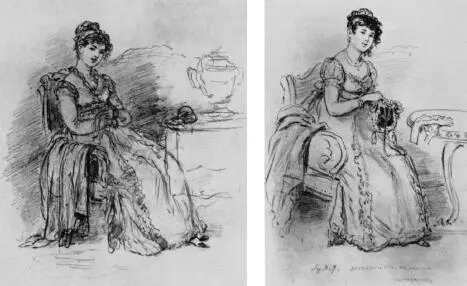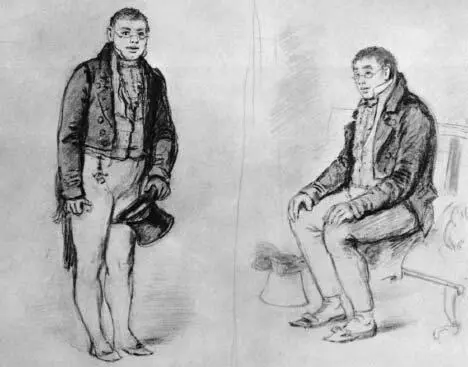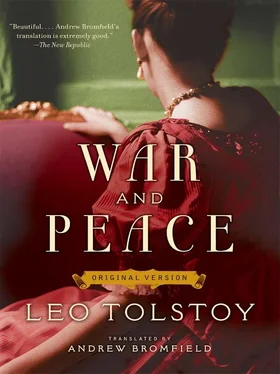1 ...6 7 8 10 11 12 ...29 “I’ve brought along my work,” she said, opening the top of her reticule and addressing everybody at once.
“Now, Annette, don’t you play any nasty tricks on me,” she said, addressing the hostess. “You wrote that you were only having a little soirée, and see how poorly dressed I am.” And she spread out her arms to show off her elegant grey gown trimmed with lace and girdled with a broad ribbon under the bosom.
“Don’t you worry, Lise, you will always be the loveliest of all,” replied Anna Pavlovna.
“You know, my husband is abandoning me, he’s going off to get himself killed,” she continued in the same tone, addressing the general. “Tell me, whatever is the point of this loathsome war?” she asked, turning to Prince Vasily and, without waiting for a reply, turned to Prince Vasily’s daughter, the beautiful Hélène: “You know, Hélène, you are becoming too lovely, just too lovely.”
“What a delightful creature this little princess is!” Prince Vasily said quietly to Anna Pavlovna.
“Your charming son Hippolyte is madly in love with her.”
“The fool has taste.”
Shortly after the little princess entered, a stout young man with short-cropped hair came in, wearing spectacles, light-coloured knee-breeches after the fashion of the time, a high ruffle and brown tailcoat. Despite the fashionable cut of his clothes, this fat young man was clumsy and awkward, in the way that healthy peasant lads are clumsy and awkward. But he was unembarrassed and resolute in his movements. He halted for a moment in the centre of the drawing room and, failing to locate the hostess, bowed to everyone except her, despite the signs she was making to him. Taking the old aunt for Anna Pavlovna herself, he sat down beside her and began speaking, but finally realising from the aunt’s astonished face that this was not the right thing to do, he stood up and said:

THE LITTLE PRINCESS Drawing by M.S. Bashilov, 1866
“I beg your pardon, mademoiselle, I thought you weren’t you.”
Even the impassive aunt blushed at these senseless words and waved with a despairing expression to her niece, beckoning for help. Anna Pavlovna left the other guest with whom she was occupied and came across.
“It’s so very good of you, Monsieur Pierre, to come to visit a poor invalid,” she said to him, smiling and exchanging glances with her aunt.
Pierre then did something even worse. He sat down beside Anna Pavlovna with the expression of a man who intended to stay for some time and immediately started talking about Rousseau, of whom they had spoken at their last meeting but one. Anna Pavlovna had no time for this. She was busy listening, watching, arranging and rearranging her guests.
“I cannot understand why,” said the young man, peering significantly at his interlocutress over the top of his spectacles, “everyone so dislikes The Confessions, when the Nouvelle Héloïse is far more inferior.”
The fat young man expressed his meaning awkwardly, challenging Anna Pavlovna to an argument and completely failing to notice that the lady-in-waiting had absolutely no interest whatever in which work was good or bad, especially now, when she had so many other things to think of and remember.

PIERRE BEZUKHOV Drawing by M.S. Bashilov, 1866
“‘May the last trumpet sound when it will, I shall appear with this book in my hand,’” he said, smiling as he quoted the first page of The Confessions. “No, madame, if you read the book, you will love the man.”
“Yes, of course,” replied Anna Pavlovna, in spite of holding entirely the opposite opinion, and she surveyed her guests, wishing to get to her feet. But Pierre continued:
“It’s not just a book, it’s an entire work. The Confessions is a total confession. Is that not so?”
“But I have no desire to be his confessor, Monsieur Pierre, his sins are too vile,” she said, rising to her feet with a smile. “Come along, I shall introduce you to my cousin.”
And having rid herself of this young man who did not know how to behave, she returned to her concerns as mistress of the house and continued listening and watching, ready to offer assistance whenever conversation flagged, like the foreman of a spinning mill who, with his workers all at their places, keeps pacing about, watching that the spindles all keep turning. And just as the foreman of the spinning mill, on noticing that a spindle has stopped or is squeaking strangely or loudly, hurries across and adjusts it or sets it moving as it should, so Anna Pavlovna approached a circle that had fallen quiet or was talking too much and, with a single word or slight rearrangement, set her regular, decorous conversational engine in motion once again.

Anna Pavlovna’s soirée was in full swing. On various sides the spindles were humming away smoothly and steadily. Apart from the aunt, beside whom there sat only a single elderly lady with a thin, tearful face, somewhat out of place in this brilliant company, and the fat Monsieur Pierre who, following his tactless conversations with the aunt and Anna Pavlovna, had remained silent for the entire evening and, evidently being acquainted with hardly anyone there, merely gazed around with lively interest at those who were walking about and talking more loudly than others, the remaining company had divided into three circles. At the centre of one was the beautiful Princess Hélène, Prince Vasily’s daughter, in the second it was Anna Pavlovna herself, in the third it was the little Princess Bolkonskaya – pretty, rosy-cheeked and very pregnant for her young age.
Prince Vasily’s son Hippolyte – “your charming son Hippolyte” as Anna Pavlovna invariably called him – made his entrance, as did the expected vicomte, over whom, according to Anna Pavlovna, “all our ladies” were quite beside themselves. Hippolyte came in peering through a lorgnette, and without lowering this lorgnette, drawled loudly but indistinctly, “the Vicomte de Mortemart” and immediately, paying no attention to his father, seated himself beside the little princess and, inclining his head so close that very little space remained between his face and hers, he began to tell her something obscure and private, laughing.
The vicomte was an attractive-looking young man, with mild features and manners who evidently considered himself a celebrity but, being well brought up, modestly permitted the company in which he found himself to take advantage of his person. Anna Pavlovna was obviously offering him to her guests as a treat. Just as a good maître d’hôtel presents as a supreme delicacy that piece of beef which no one would wish to eat if they had seen it in the filthy kitchen, so this evening Anna Pavlovna served up the vicomte to her guests as something supremely refined, although the gentlemen who were staying at the same hotel and played billiards with him every day saw him as little more than a master of cannon shots, and did not feel in the least bit fortunate to have met the vicomte and spoken with him.
Talk immediately turned to the murder of the Duc d’Enghien. The vicomte said the duke had been killed by his own magnanimity and that there were particular reasons for Bonaparte’s animosity.
“Ah! Do tell us about that, vicomte,” said Anna Pavlovna.
Читать дальше















